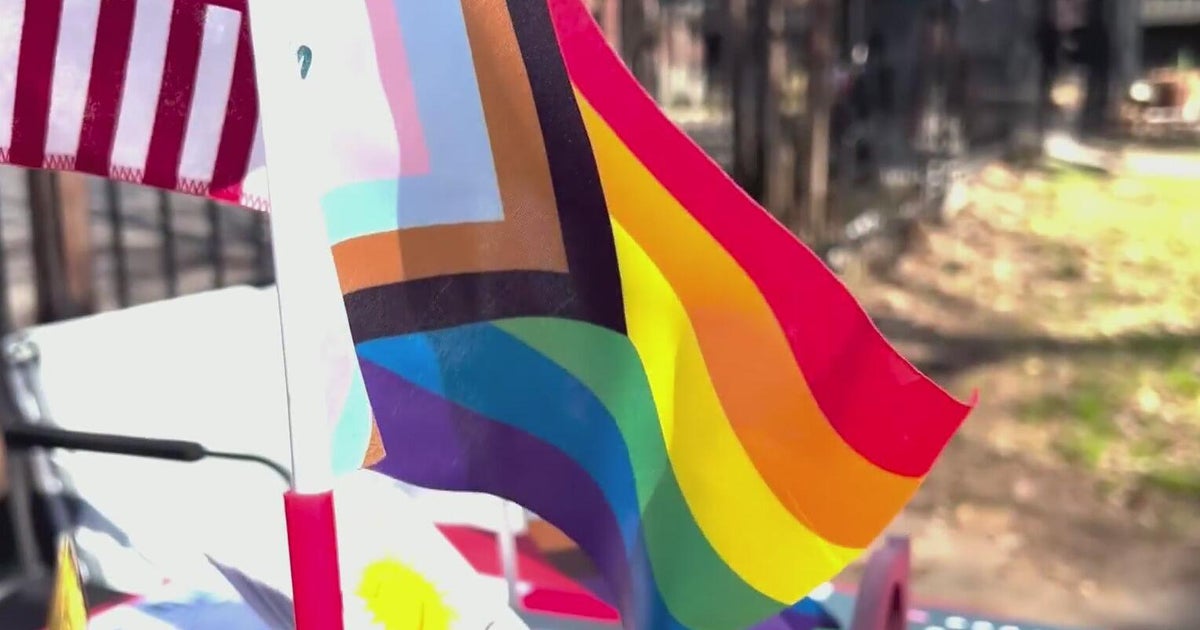This year on pace to see record anti-transgender bills passed by states, says Human Rights Campaign
This year is on pace to see more legislation targeting transgender youth than any prior year, according to the Human Rights Campaign.
One area of contention stems from the increasing prevalence of gender identity instruction in schools and the recent rise of so-called "parental rights" measures that would stop any classroom discussion of gender in classrooms or ban books on gender identity from school libraries .
Other measures take issue with LGBTQ+ participation in high school and college competitive sports — 140 of the bills introduced would deny them medical care for gender transitions and impose limits on which bathroom they may use. Overall, more than 300 anti-LGBTQ+ bills have been proposed in 2022, according to the advocacy group's tracker.
"This is something that has been building over the course of the last three years," said Kate Oakley, the organization's state legislative director and senior counsel. "We're very much on track to surpass last year's 150 [pieces of legislation] record."
Sam Ames, the director of advocacy and government affairs for The Trevor Project, said that educational gag orders in state legislatures have already affected trans students regardless if they've passed. The Trevor Project is the world's largest suicide prevention and mental health organization for LGBTQ+ youth.
"Some of our research has shown that as many as 85% of trans youth say that they are watching these debates over their identity play out," Ames said. "The direct results of these bills when they pass are to take away things that we know are correlated with increased mental health and decreased suicide risk: sports team participation, seeing yourself represented in a classroom, being accepted by your parents and your healthcare professionals. These are all associated with significantly lower odds of attempting suicide."
The Trevor Project's 2021 National Survey found that 42% of LGBTQ+ youth have seriously considered attempting suicide in the last year. And for transgender and non binary youth, that number increased to 52%.
The policies show a trend in Republican legislatures to push what they see as an animating issue for their base, in the face of outrage from LGBTQ+ groups and vetoes by some Republican governors.
Legislation that keeps trans youth from participating in sports has been introduced in at least 30 states this year, according to the American Civil Liberties Union. Bans have been implemented in at least four states: Arizona, Iowa, South Dakota and Utah. Tennessee's governor has a similar bill awaiting signature on his desk.
But some Republican governors have rejected the bans, too, worried about the effect of excluding trans youth. Indiana Governor Eric Holcomb, a Republican, vetoed a bill that would prohibit trans participation in school sports. Utah's Republican governor, Spencer Cox, vetoed a bill that would limit trans student athlete participation, citing an increase in suicides among trans youth and the small number of trans athletes as part of his reasoning.
"I don't understand what they are going through or why they feel the way they do," Cox said in a statement. "But I want them to live. And all the research shows that even a little acceptance and connection can reduce suicidality significantly."
He wasn't able to stop the bill from becoming law — the Utah Legislature overrode Cox's veto, and Indiana's is expected to do the same.
Alabama has passed the most "anti-transgender" legislative package in history, Oakley said.
Its main bill, "The Alabama Vulnerable Child Compassion and Protection Act," prohibits the use of puberty blockers or any medical procedure for those under 19 years old that is related to changing gender. The bill also requires teachers and school employees to inform parents if a student's "perception of his or her gender or sex is consistent with the minor's sex."
The bill makes it a felony — with a maximum prison sentence of 10 years — for a doctor to perform surgery or prescribe any medication for a gender transition.
"It is not permissible for a legislature or governor to be making law that discriminates against a very small group, very vulnerable group of people, simply because they don't like them," Oakley said, referencing HRC's legal challenge to Alabama's bill. "That's a violation of equal protection of the law."
Bills that restrict healthcare for trans youth, similar to Alabama's, have been introduced in at least 19 states, according to the ACLU. The Arkansas Legislature passed a similar law in 2021, but it was overturned by a federal court.
"Our job is to teach students and make them feel welcome," 2021 Alabama Teacher of the Year Andy Jackson told CBS News.
"As individuals transition, and they choose a name that suits them, whether I agree or disagree with their transition, my job as a teacher is to support and validate who they are," said Jackson, a National Board-certified instructor who teaches fourth grade in Pell City, Alabama.
John Wahl, chairman of Alabama's Republican party, defended the bills passed in Alabama as necessary "protection" for children and a "positive reinforcement of family values." He criticized an education system that teaches sex education "younger and younger" and framed the debate as one about "parent's rights" to their child's education.
"I think parents across the country want our children to stay children," he said. "There are genders, whether we want to admit it or not. There are males and there are females, and we can stick our heads in the sand all we want, but there's a lot of people out there who just know it's common sense. They know that there are male and female, they know there's gender roles, and they're not going to just sit here and have that redefined out of that natural law."
Asked if it would have hurt Alabama Governor Kay Ivey politically in her primary race if she hadn't signed the bill, Wahl said, "It definitely would have." Ivey is being challenged on the right by Lindy Blanchard, a former ambassador to Slovenia who is backed by former President Trump.
"I think the vast majority of Republicans are with the Republican Party on this issue," Wahl said. "Also, I think there are a great deal of independents, and even a lot of Democrats who understand this. This is a common-sense issue."
A March PBS NewsHour/NPR/Marist poll found that 38% of Republican adults support criminalizing gender transition-related medical care for minors. That number grows to 42% among those who voted for Trump in 2020.
Another bill passed by Alabama includes language similar to Florida's controversial "Parental Rights in Education" bill, which prohibits classroom instruction on sexual orientation or gender identity in kindergarten through third grade, or in older grades in "a manner that is not age-appropriate or developmentally appropriate."
Wahl argued, "There's this idea that you push this on children younger and younger, when they're not really mentally ready. And I think that's a tragedy. I think most children are seeing this [issue] more in the media than they are through state legislatures."
The public debates are taking a toll on students like Codi Rasor, a 17-year-old at Montgomery County High School in Kentucky, who identifies as gender-fluid, a designation that falls under the trans umbrella.
"It's scary," Rasor said. "With these bills being passed, there's the potential that we wouldn't be able to have a safe space in a classroom or in a school system."
Last week, Kentucky's Republican majority overrode Democratic Governor Andy Beshear's veto of the Fairness In Women's Sports Act. While it isn't surprising to Rasor, the president of their school's Gender Sexuality Alliance group, Rasor believes Kentucky's anti-trans sports bill is a non-starter.
"Transgender women are women," Rasor said. "Essentially, that is what it boils down to — it's that a transgender woman or a transgender man are their gender."




